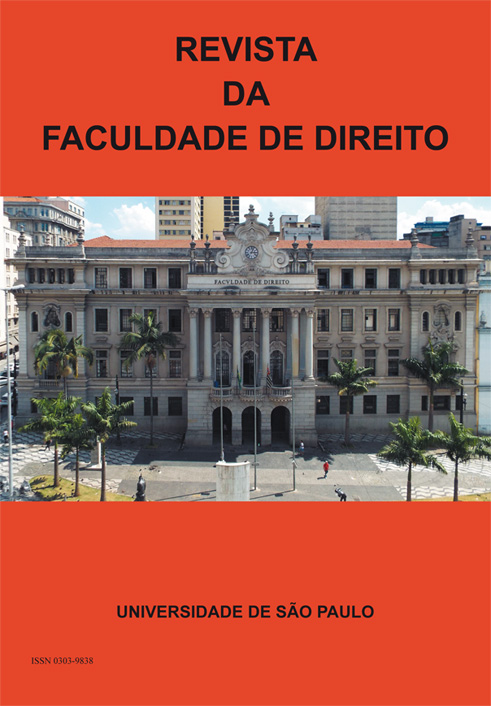Liability for eviction and latent defects in the roman law of sale: stipulatio simplae and exclusion of rescission
DOI:
https://doi.org/10.11606/issn.2318-8235.v114p763-789Keywords:
Roman Law, Sale contract, Vendor’s liability, Liability for eviction, Liability for latent defects, Venditio simplariaAbstract
Classical Roman Law already knew the distinction between liability for eviction and latent defects, which had independent foundations and did not follow the same logic. The liability for eviction arose from the celebration of a stipulatio specifically for this purpose, whereas the liability for latent defects was foreseen in the Ediles Curules Edict for market regulation, in form of the actiones redhibitoria and quanti minoris. Notwithstanding, these two plans seem to intersect in the curious fragment D. 21, 1, 48, 8 of Pomponius, which, contrary to what suggests the prevailing opinion, contains a hypothesis of interconnection between the two sides of the vendor’s liability. According to him, if the liability for eviction was reduced (i.e. when stipulatio simplae was celebrated instead of the usual duplae, wherein the so called “venditio simplaria” consisted), the silence of the parties regarding liability for latent defects would lead to a presumption of its exclusion. This reading of the fragment finds support not only in a grammatical analysis of its text (focused mainly on the interesting word “simplaria”, that occurs in no other classical Latin document whatsoever), but also in several legal sources related to the subject, specially the Egyptian papyrus P. Cair. Preis. 1, where the presumption mentioned by Pomponius is apparently applied by a lawyer in a real case.
Downloads
References
ACCURSIUS. Magna Glosa. Lugduni: [s. n.], 1627. v. 1.
ANKUM, Hans. Gaius en Paulus, vertaald door J. E. Spruiten Κ. E. M. Bongenaar. Zeitschrift der Savigny-Stiftung für Rechtsgeschichte: Romanistische Abteilung, Österreich, v. 106, n. 1, p. 626-632, 1989.
BUDÉ, Guillaume. Annotationes Gulielmi Budaei Parisiẽsis, secretarii regii, in quatuor et viginti Pandectarum libros. Pariisis: Imprimebat Michaël Vascosanus, 1543.
D’ORS, Álvaro. El digesto de Justiniano. Pamplona: Aranzadi, 1972. v. 2.
DERNBURG, Heinrich; SOKOLOWSKI, Paul von. System des römischen rechts. Berlin: Müller, 1912.
DONADIO, Nunzia. La tutela del compratore tra actiones aediliciae e actio empti. Milano: Giuffrè, 2004.
DONELLUS, Hugo. Commentariorum iure civili, 13, 3, 5. In: ______. Opera omnia. Florenz: [s. n.], 1861.
ERNST, Wolfgang. Neues zur sachmängelhaftung aufgrund des Ädilenedikts. Zeitschrift der Savigny-Stiftung für Rechtsgeschichte: Romanistische Abteilung, Österreich, v. 116, n. 1, p. 208-221, 1999.
FORCELLINI, Egidio. Totius latinitatis lexicon. Oxford: Oxford University Press, 1835. v. 4.
GEORGES, Karl Ernst. Ausführliches lateinisch-deutsches handwörterbuch. Darmstadt: Wissenschaftliche Buchgesellschaft, 1998. v. 2.
GILLIAM, James Frank. The sale of a slave through a Greek ‘diploma’. The Journal of Juristic Papyrology, Warsaw, v. 16-17, p. 63-70, 1971.
GLARE, Peter G. W. (ed.). Oxford latin dictionary. Oxford: The Clarendom Press, 1945. v. 2.
GLÜCK, Christian Friedrich von. Ausführliche erläuterung der pandecten nach Hellfeld: ein kommentar. Erlangen: Palm & Enke, 1819. v. 20, s. 1.
HONSELL, Heinrich. Von den ädilizischen rechtsbehelfen zum modernen sachmängelrecht. In: NÖRR, Dieter; SIMON, Dieter. Gedächtnisschrift für Wolfgang Kunkel. Frankfurt am Main: Vittorio Klostermann, 1984.
HONSELL, Heinrich; MAYER-MALY, Theo; SELB, Walter. Römisches recht. Berlin-Heidelberg: Springer, 1987.
HULOT, Henri. Les cinquante livres du Digeste ou des Pandectes de l’empereur Justinien. Metz: Behmer et Lamort, 1804. v. 3.
IMPALLOMENI, Giambattista. L’editto degli edili curuli. Padova: Cedam, 1955.
JAKAB, Éva. Cavere und haftung für sachmängel: zehn argumente gegen Berthold Kupisch. In: JAKAB, Éva; ERNST, Wolfgang (org.). Kaufen nach römischem recht: antikes erbe in den europäischen Kaufrechtsordnungen. Berlin: Springer, 2009.
JAKAB, Éva. Praedicere und cavere beim Marktkauf: Sachmängel im griechischen und römischen Recht. München: Beck, 1997.
JAKAB, Éva. Prozess um eine entlaufene sklavin (P. Cair. Preis. 1): vertrag in der provinzialen rechtskultur. Zeitschrift der Savigny-Stiftung für Rechtsgeschichte: Romanistische Abteilung, Österreich, v. 135, n. 1, p. 474-526, 2018.
KASER, Max; KNÜTEL, Rolf; LOHSSE, Sebastian. Römisches privatrecht. 21. ed. München: Beck, 2017.
KUPISCH, Berthold. Römische sachmängelhaftung: ein beispiel für die ‘ökonomische analyse des rechts’? Legal History Review (Tijdschrift voor Rechtsgeschiedenis), v. 70, p. 21-54, 2002.
LENEL, Otto. Palingenesia iuris civilis. Leipzig: Tauchnitz, 1889. v. 2.
LEWALD, Hans. Eine synchoresis aus der zeit des Commodus: Papyrus Rainer G. 25 817. In: Festschrift für Arangio-Ruiz, Neapel: Dott. Eugenio Jovene, 1953. v. 3.
MEMMER, Michael. Der „schöne Kauf“ des „guten Sklaven“. Zeitschrift der Savigny-Stiftung für Rechtsgeschichte: Romanistische Abteilung, Österreich, v. 107, n. 1, p. 1-45, 1990.
MEYER, Paul Martin. Neue juristische Papyrus-Urkunden und Literatur. Zeitschrift für Vergleichende Rechtswissenschaft, Stuttgart-Feuerbach, v. 39, p. 220-282, 1921.
MITTEIS, Ludwig. Grundzüge und Chrestomathie der Papyruskunde. Leipzig: B. G. Teubner, 1912.
PARTSCH, Joseph. P. Freib. II. Heidelberg: [s. n.], 1916.
PRINGSHEIM, Fritz. The greek law of sale. Weimar: H. Böhlaus, 1950.
RABEL, Ernst. Grundzüge des römischen privatrechts. 2. ed. Darmstadt: Wissenschaftliche Buchgesellschaft, 1955.
SALOMONS, Robert Paul. P. Cair. Preis. (2). Bruxelles: Association égyptologique Reine Elisabeth, 2014.
SCHIPANI, Sandro (dir.). Iustiniani Augusti Digesta seu Pandectae: testo e traduzione. Milano: Giuffrè, 2011. v. 4.
SELB, Walter; KAUFHOLD, Hubert. Das syrisch-römisches rechtsbuch. Wien: Österreichischen Akademie der Wissenschaften, 2002. v. 1.
URBANIK, Jakub. P. Cairo Masp. I 67120 recto and the liability for latent defects in the late antique slaves sales: or back to ‘epaphe’. The Journal of Juristic Papyrology, Warsaw, v. 40, p. 219-247, 2010.
VIGNALI, Giovanni. Corpo del diritto: Digesto. Napoli: Pezzuti, 1857. v. 3.
WATSON, Alan. The digest of justinian. Philadelphia: University of Pennsylvania, 1985. v. 2.
WEIß, Egon. Peregrinische manzipationsakte. Zeitschrift der Savigny-Stiftung für Rechtsgeschichte: Romanistische Abteilung, Österreich, v. 37, n. 1, p. 136-176, 1916.
WENGER, Leopold. Die quellen des römischen rechts. Wien: A. Holzhausen, 1953.
WINDSCHEID, Bernhard; KIPP, Theodor. Lehrbuch des Pandektenrechts. Frankfurt am Main: Rütten & Loening, 1906. v. 2.
WOLFF, Hans Julius. Das recht der griechischen papyri Ägyptens in der zeit der Ptolomäer und des prinzipats. München: C.H. Beck, 2002.
Downloads
Published
Issue
Section
License
Copyright (c) 2019 Revista da Faculdade de Direito, Universidade de São Paulo

This work is licensed under a Creative Commons Attribution-NonCommercial-ShareAlike 4.0 International License.


